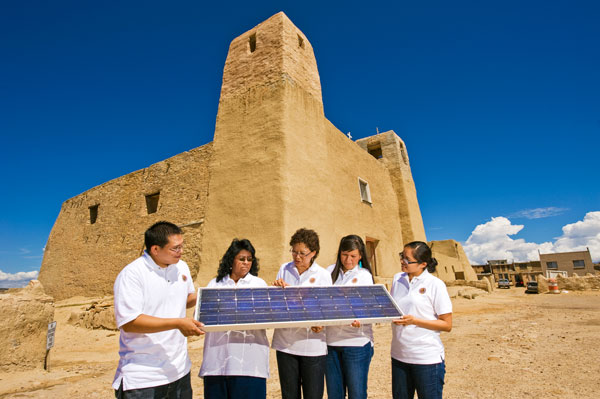
American Indian and Alaska Native science, technology, engineering, and math students face extraordinary odds when pursing higher education. As the most underrepresented group in STEM education, AI and AN students often enter the workforce as a significant minority with little support. According to a 2015 National Action Council for Minorities in Engineering report, AI and AN students represented only 0.4% of all engineering bachelor’s degree recipients, 0.3% of the engineering workforce, and 0.1% of all engineering faculty. AI and AN students can intern at Sandia through the DOE’s Office of Indian Energy Policy and Programs internship program.
The program, implemented through Sandia, offers unique interactions with professional connections to tribal leaders and staff based on personal rapport. Interns also gain access to seminars and conferences that showcase tribal energy projects as well as meet-and-greet opportunities with energy leaders and staff.
DOE Indian Energy interns leverage their experiences at Sandia and beyond to complete a diverse set of research work. Since its inception, the program has hosted 44 undergraduate and graduate students, 60% female, from 13 tribal affiliations. On average, approximately 20% of the interns convert to year-round status, while 15% were hired as Sandia employees.
After their internships, former interns have focused their work: 50% of students pursue research directly related to tribal energy work, 36% seek research in STEM and 4% seek nonprofit work.
Where are they now?
Program graduates have greatly impacted STEM research, education and access for future generations. Three former interns share where they are now and how they use their internship experience daily.
Tommy Jones
Tommy Jones was a DOE Indian Energy intern at Sandia from 2014 to 2016 and is now the Deployment Specialist for the Office of Indian Energy where he helps to execute the office’s deployment program. His current role includes coordination of financial and technical assistance education and outreach to tribal communities across the United States. He is a member of the Naknek Native Village of Alaska and a Native shareholder of Bristol Bay Native Corporation as well as a citizen of the Cherokee Nation of Oklahoma.
Tommy’s current work emphasizes the need for local community and tribal support by investing and educating youth about energy resiliency and reliability.
Suzanne Singer
Suzanne Singer was a DOE Indian Energy intern in 2008 and 2009 and is a member of the Navajo Nation. After her internship at Sandia, Suzanne cofounded Native Renewables, a nonprofit organization that brings solar installation, maintenance, education and support to native communities across the country. In 2019, Suzanne received the U.S. Clean Energy Education and Empowerment Entrepreneurship Award.
Lani Marina Tsinnajinnie
Lani Marina Tsinnajinnie was a DOE Indian Energy intern at Sandia in 2006 and is a member of the Navajo Nation. She is currently a hydrologist and an assistant professor in the Community and Regional Planning Department at the University of New Mexico. In her role, she teaches students about environmental issues due to climate change impacts, particularly how water resource issues affect native communities.
Lani’s passion is leveraging her research to partner with the Navajo Nation to collect and analyze water data. She also enjoys giving back to her community by teaching students about tribal water management and research as a professor. Lani recently shared her story with the Explora Science Center.
Sandia mentorship
Along with personalized support from subject matter experts and an introduction into the work of STEM careers, interns have access to many Sandia facilities including the National Solar Thermal Test Facility, the Distributed Energy Testing Lab and the Photovoltaics Systems Evaluation Lab.
The success of the program is made evident by relationships formed among the interns and their mentors, particularly Sandian Sandra Begay, who has led the internship program for the DOE Office of Indian Energy, and its predecessor program, for 16 years. Sandra is a member of the Navajo Nation.
“Her lifelong tireless work to ensure that current and future generations of Native Americans have positive and productive impacts through STEM is unparalleled. Sandra has changed countless lives for the better, mine included,” says Tommy.
Sandra Begay was recently recognized for her decades-long mentorship and technical accomplishments related to the program. In 2020, Sandra received the AISES Indigenous Excellence Award for her technical work and mentorship of 42 AI and AN college students.
“Twelve years ago, I had the fortune of working with Sandra as a graduate student intern. I truly credit her for launching my career in tribal energy and renewable energy — it was the first time I realized I could use my expertise to help tribes. I doubt that I would be the entrepreneur I am today without Sandra’s guidance,” says Suzanne.
Future of the program
The future of DOE Indian Energy interns at Sandia is bright. Sandia plans to hire two year-round graduate interns in the fall of 2021 and five summer interns in 2022.